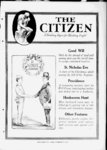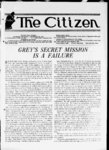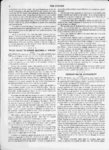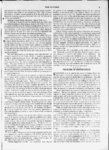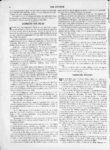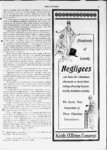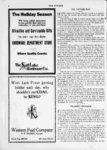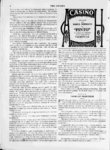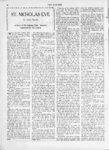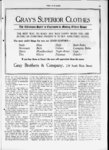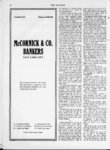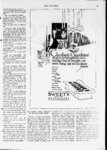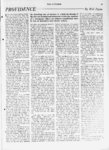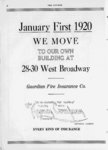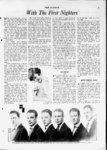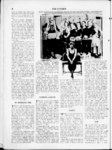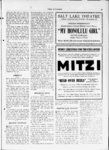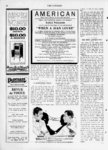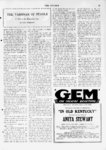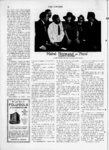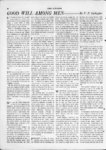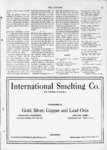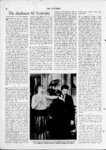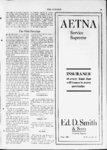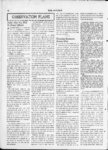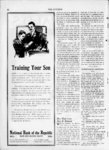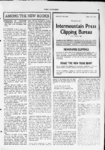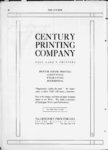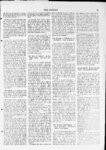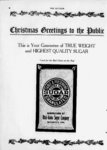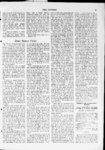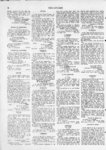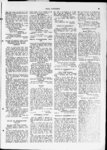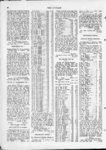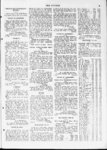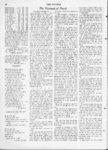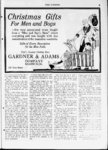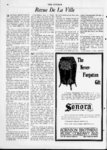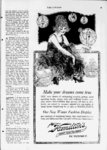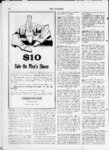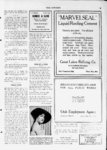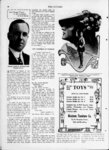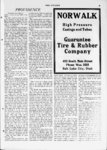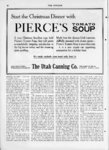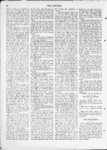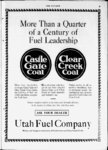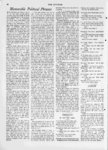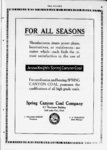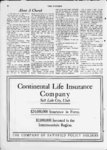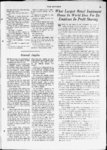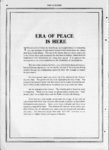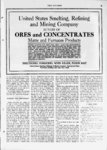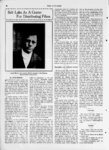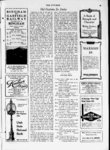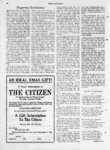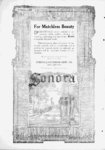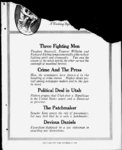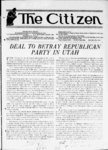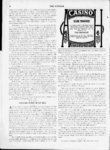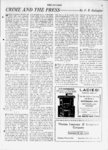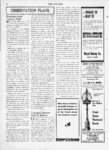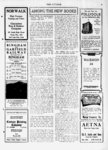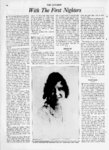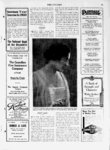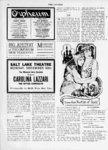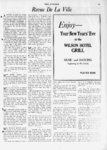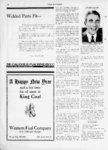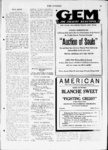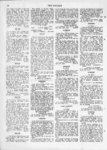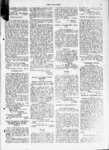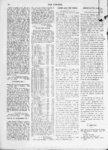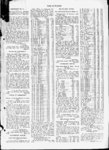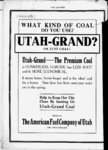| OCR Text |
Show THE CITIZEN 26 GOOD WILL AMONG MEN- ratify the covenant of the League of Nations the United States senate has taught Great Britain a lesson which is being brought home to her by many of her leading statesmen and publicists. While no Englishman admits that T) Y refusing to his country was wrong in going to the defense of Belgium and France, many Englishmen now regret that the constitution permits a few men to make secret treaties that may hurl the empire into war at any moment. A premier and a foreign secretary, back, ed by the families that rule the British empire, entered into an entente cordiale which bound Great Britain to support iFrance in case of An attack by Germany. The democracy of the empire had nothing to do with it, and when the day of decision came the parliament discovered that it was simply a rubber stamp. It was bound in honor to indorse the war that Sir Edward Grey had provided for by the entente cordiale and by a pledge given to France on the very eve of hostili- ) ties. is not to say that Great Brit-ai- n committed any moral wrong in entering the war. On the contrary, the British empire joined in one of the justest of wars and fought to prevent the domination of the world by rp HIS a military autocracy. The war helped the British people to see the weakness of their constitution and the action of the senate in rejecting the covenant has opened the eyes of many of them to the necessity of limiting the power of a few statesmen to bind Great Britain by secret treaties. XT OT until the United States By F. P. Gallagher - sen-- 1 ate took its stand against secret diplomacy and secret treaties did the British public realize to what extent, during the progress of the war, they had been bound to fight future wars. Lloyd George and a few powerful personages had agreed with Japan, Italy, Russia and Persia on secret compacts involving the disposition of much of the earths surface and fixing upon the British people obligations of almost immeasurable limits. Occasionally we have pointed out that our own constitution does not completely protect us against the action of the chief executive in the mat- ter of war. If a president is deter-mine- d to force a war he may do so by initiating negotiations in such a way that the congress cannot back down when once an issue has been made. But in the matter of treaties our constitution affords ample protection. No treaty can be ratified withs vote of the senate. out a Consequently the president or his sectwo-third- retary of state are prevented from en- tering into agreements such as the entente cordiale which secretly bound Great Britain and France to help each other in war. T N the course of the war it was im-- A pressed upon the minds of men everywhere that warfare would be less frequent if the right to declare war were given to the people themselves. .That was the view of the framers of our constitution and that is why they provided that war should be declared only by the chosen representatives of the people. The action of the United States senate, therefore, is having a worldwide effect. Had it ratified the treaty without reservations it would have confirmed all the secret treaties which the Versailles conference had acquiesced in. By declining to accept the treaty wtihout changes the senate forced the whole world to fix its attention upon the sins of the Versailles conference. It condemned secret diplomacy with so thunderous a voice that no nation could fail to take notice. It revived the opinion, almost forgotten after the armistice had been power signed, that the should be taken out of the hands of a ruling class and placed in the hands war-makin- g t of the people. interests it set an example for the world. That example is bearing fruit in Great Britain, where some of the most distinguished men are urging constitutional changes which will wrest the and therefore the power from the hands of a few men and put it truly in the hands of parliament. treaty-makin- the form of a contest between races exclusively on one side and white races on the other. dark-skinne- It would be folly to deny the peril. It is a disease! The center of infection, so to say, lies in the white mans g, assumption of superiority and his desire not to permit a mingling of all the races. In our own country the melting pot is for the white races alone. Some day, perhaps, race hatreds will disappear ml all the races will merge, but that day may be far war-makin- g, . Moreover, the world is going to in-sist on open covenants. In the first instance neither peoples nor parliaments can share in negotiations. Necessarily the diplomatic correspondence must be between a few men and if these exchanges are in secret senates and parliaments will find themselves morally bound by compacts over which they will have no control. If statesmen must make compacts in the open they will be inclined to make only such compacts as will stand the test of public opinion in their own lands and throughout the world. When the day comes that covenants are openly arrived at the whole world will be in an entente cordiale which will be more productive of peace than any formal league of na- later than the means of - secret compacts. of course, the senate P RIMARILY, majority acted to protect Ameri- can interests, but by protecting our inter-communicatio- Fast n.' ships, airplanes and Zepelins, in addition to increasing railway facilities in all continents ,are throwing the races together. They must be friends or fight Viewed from this standpoint the yellow peril becomes obvious. Jealousies and race hatreds will cause constant friction unless more powerful influences intervene. We have but to consider the friction between Amer. lean and Japanese troops in Siberia to understand the problem. Although they are allies and are supposed to get along together, they are almost at swords point upon occasion, and are restrained with difficulty from fighting. The powerful Influences that may intervene to prevent the conflict are Christianity and democracy. If it be said that Christians have set a poor o example and that Christianity has not prevented wars it can be said truthfully that Christianity, nevertheless, has been an influence for peace. All the Holy Alliances and other instrumentalities looking to peace have had their origin & the Christian spirit Their moral basis has been Christian teaching. If Christianity should become a uni- versal religion in fact the chance of a conflict between the and the white races would be lessened. And if democracy that is to say, gov. emment by the people should become universal, it would help to maintain peace. The present friction between Americans and Japanese is due In large measure to their conflicting governmental ideals. The Americans are wedded to freedom and represent- ative government. The Japanese are still in the grasp of autocracy. They are ruled by an emperor whom they .hold to be divine and are possessed by the Teutonic idea that only by war $ power of Asia. Walter Rathenau, said to be Germanys greatest organizing genius, has presented the peril to us recently in a somewhat different form. At the beginning of the next century, he says, there will only be only three dominant nrld powers Japan, Russia and the United States. He pre- diets that Russia and Japan, in alliance, will destroy the third power. Just why the Russians, a white race, should ally themselves with Japan, is not manifest If there is to be a yellow peril it Is more likely to take $ century. t of the world are being brought closer together by rapid 7 ARNING The president gave the European statesmen a wholly mistaken view of American opinion. Going abroad with a personal proclamation that covenants were to be openly arrived at, he joined in upholding practically all of the secret treaties disposing of vast territories and millions of people Naturally the conferees acquired the wrong impression regarding the American viewpoint Although, no doubt most of them understood the provisions of our constitution Elating to treaties they began to think that the president of the United States equaled them in his power of making treaties. And then came his dictum: It seems that the war has been fought to enforce the sacredness of treaties. That was to surrender the whole case of democracy everywhere and to sanction the old diplomacy of twenty-firs- 'T'HE races tions. In other words, it is by good will that the peace of the world must be preserved. Without good will as between nation and nation no artificial machinery can prevent war. Good will among men, however, has many things to overcome, but chiefly class hatreds and racial antipathies. the American people of the yellow peril was one of the favorite propaganda methods of the Germans just before we plunged-intthe world war. We were told that the white race must prepare for the war with the yellow races and that the United States should rather ally itself with the Teutons, .who intended to conquer the peril, than with nations which, as in the case of Great Britain, had formed offensive and defensive alliances wtih the leading d dark-skinne- d . ' |
